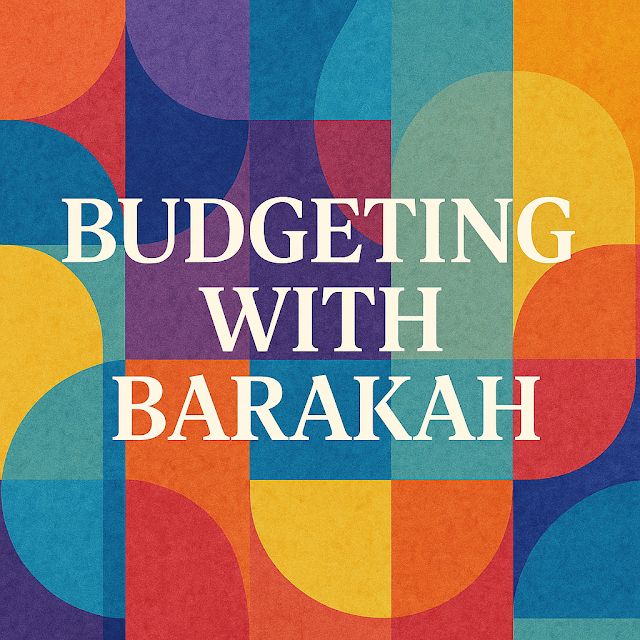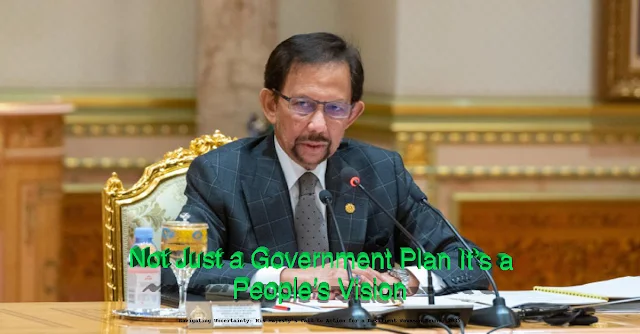The question took me by surprise. It was sincere, direct and challenging to answer casually.
It warranted more than a quick remark. As someone who has observed national plans, policies, and commitments for decades, I felt the need to pause and reflect.
Just as I began to grapple with that question, a quiet proposal appeared in my chat - a vision paper exploring the potential of WAQAF governance to revitalise Brunei’s national agenda.
Authored by DMAO, the paper didn't shout; it whispered. Yet, it communicated something many of us have struggled to articulate: Wawasan 2035 is not dead, but it may have drifted from the soul it was meant to serve.
What follows is not a critique or rejection of Wawasan 2035. It is a reflection - an invitation - to reconsider how we might realign national progress with national purpose.
A Proposal Rooted in Our Soil
Interestingly, Brunei already practices a form of waqf without officially naming it as such.
The Brunei Darussalam Mosque Construction Fund, which has raised over BND 16 million through public donations since 2015, exemplifies the waqf philosophy.
These funds, voluntarily given, permanently allocated, and transparently managed, finance the construction and maintenance of mosques throughout the nation.
This demonstrates that the spirit of WAQAF is already alive among Brunei's people - what is needed now is for policy to align with practice, expanding such models beyond mosques to encompass schools, clinics, youth centres, and sustainable enterprises.
Similarly, Yayasan Sultan Haji Hassanal Bolkiah, established in 1992, serves as a prime example of a WAQAF institution that has long supported education, healthcare, and welfare - independent of government budgets or political cycles.
The proposal suggests expanding this success to additional areas: schools, water supply, food security, and community clinics, transforming them into what it refers to as Sunken Social Assets.
These are not merely "donations" but investments in public dignity, designed to endure, governed with care.
To explore and strengthen the ideas presented by DMAO, we conducted additional research across international and Brunei-specific studies, including works by the AlBaraka Forum for Islamic Economy, the BITARA Journal, and a foundational paper on Negara Zikir.
These investigations confirmed the strategic and spiritual relevance of WAQAF as a governance tool aligned with Maqasid Syariah, Brunei's MIB philosophy, and the global Sustainable Development Goals.
Introducing the “Waqudget”: Where Spirituality Meets Spending
Imagine a government budget that focuses not just on dollars and cents, but also on spiritual impact and moral return. The proposed “Waqudgeting” system categorises national spending into areas such as:
· WQ1: Enduring Social Infrastructure (schools, clean water)
· WQ4: Sustainable Livelihoods (jobs, food, energy)
Each category is ranked by urgency using Islamic legal priorities:
· Daruriyyat (necessities)
· Hajiyyat (complementary needs)
· Tahsiniyyat (enhancements)
This approach encourages spending guided by trust, ethics, and accountability to Allah, infusing barakah (divine blessings) into national development.
Our research supports that this framework echoes historical successes of WAQAF in the Muslim world, where public assets - schools, hospitals, roads - were financed through community trusts rather than state debt.
This makes WAQAF not just a moral choice but a fiscally sustainable one.
Additionally, WAQAF is increasingly recognised as a Shariah-compliant mechanism aligned with the United Nations Sustainable Development Goals (SDGs).
Specifically, it offers Brunei a homegrown tool to:
· Address poverty (SDG 1)
· Ensure quality education (SDG 4)
· Promote health and well-being (SDG 3)
· Reduce inequality (SDG 10)
· Develop sustainable cities and communities (SDG 11)
These align seamlessly with Brunei’s long-term development goals and global commitments under Wawasan 2035.
An Islamic Answer to Modern Problems?
Ironically, while WAQAF is deeply Islamic, its logic mirrors China’s use of State-Owned Enterprises (SOEs) to drive development. Brunei could pursue a similar path, but rooted in faith, not ideology.
This vision embodies what some term Islamic Social Capitalism - a balanced approach between unregulated markets and excessive government control.
In this model, the state entrusts wealth rather than owning or privatising it, ensuring fairness across generations.
Our deeper exploration of regional practices indicates that institutionalising WAQAF through a national Waqf Authority or integrating it into existing agencies like MUIB could mobilise dormant assets, including underutilised land and endowments, to support the pillars of Wawasan 2035.
Why This Matters Now
A clear example of this misalignment is evident in the long-delayed construction of the Mosque and Islamic Learning Centre at Senukoh, Temburong.
Initiated over a decade ago with an initial projected budget of BND 5 million, it was later revised to BND 3 million after prolonged deliberations and austerity measures.
Yet, the project still awaits final approval. This delay signifies not just bureaucratic inefficiency, but a governance mindset that sometimes neglects essential duties and responsibilities outlined in Maqasid Syariah, particularly the protection of religion (hifz al-din) and intellect (hifz al-‘aql).
When communities are left waiting for basic religious and educational facilities, we must ask: Are we budgeting with barakah or merely balancing spreadsheets?
Many Bruneians feel that Wawasan 2035 has devolved into more of a slogan than a substantive plan.
Bureaucratic inertia, execution gaps, and an overdependence on oil and gas present critical challenges.
This proposal does not claim to solve every issue. However, it offers a fresh perspective - one that integrates spiritual conviction with strategic policy.
It reminds us that development is not solely about numbers; it's about rahmah (compassion), ukhuwwah (brotherhood), and khidmah (service).
WAQAF, as our research shows, is closely tied to the concept of Negara Zikir, where governance acts as a form of worship and public service is evaluated not just in outcomes, but in sincerity and blessings.
What Critics Say and Why It Still Matters
Some may argue, “Don’t bring religion into governance.” Others might label it idealistic or unconventional.
However, this perspective overlooks the essence of WAQAF. It is not a retreat from contemporary governance; rather, it is an elevation of it.
In an age when trust in systems is eroding, a model rooted in Amanah (trust) and Ihsan (moral excellence) might be precisely what we require.
A Glimpse into the Future
Siti, a 28-year-old teacher in Temburong, shared that her school lacks basic science equipment and still uses textbooks from a decade ago.
"If our village had a waqf-funded learning lab or even a proper broadband connection, I wouldn't have to ask my students to take turns using my phone for Google searches," she said with a smile.
Her experience is not isolated. Across Brunei, small entrepreneurs, educators, and caregivers struggle to meet daily challenges that WAQAF could help address - not through subsidies, but through shared, sustainable stewardship.
Conclusion: A Call for Dialogue, Not Dogma
When the question "What is your real take on Wawasan 2035?" was posed, I felt uncertain about my response.
Now, after engaging with the WAQAF proposal and contemplating our national direction, my answer is clearer: We don’t need to abandon Wawasan 2035. We need to reconnect it to our values, our people, and our future.
If that path includes a model like WAQAF - one rooted in dignity, sustainability, and divine trust - then perhaps, just perhaps, Brunei can lead not by merely catching up to others, but by inspiring them.
To initiate this journey, we could organise a national WAQAF dialogue - bringing together policymakers, economists, religious scholars, and youth to explore how WAQAF can be institutionalised in Brunei.
This could be followed by a white paper assessing legislation, proposing governance frameworks, and outlining pilot initiatives aligned with Wawasan 2035.
The time to act is not some distant day - it is now, while trust, tradition, and opportunity converge.
While dialogue and white papers have their place, Brunei no longer needs more justification; it needs a bold leap into implementation.
As one elder in our community aptly put it, “Luan banyak udah perbahasan ani, buat tia.”(We’ve talked long enough—now let’s act.)
The roundtable must transcend mere conversation. Its true purpose is to catalyse real implementation - to greenlight pilot WAQAF initiatives, embed them institutionally, and restore the public’s faith that development grounded in our spiritual values is not just feasible, but already overdue. (MHO/05/2025)



.jpeg)


